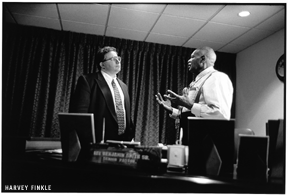
Dr. John J. DiIulio Jr. has taken leave from his position as the Frederic Fox Leadership Professor of Politics, Religion and Civil Society and professor of political science to run the first White House Office of Faith-based and Community Initiatives. The office will channel as much as $10 billion a year to faith-based groups to provide social services traditionally carried out by the government.
According to
DiIulio, a Democrat who was appointed by President George W. Bush, the
extent to which community-based religious organizations are already major
social-service providers “has been largely underappreciated and largely
unheralded [“John DiIulio Gets Religion,” October 1997, and “Gazetteer,”
January/February 1999]. In Philadelphia alone, looking across a range
of 215 different social services based on data gathered from 2,000 congregations,
you’re talking about one-quarter of a billion dollars a year in social
services provided right now. If they went away tomorrow, somebody would
have to provide those food pantries, clothing [banks], soup kitchens—as
well as one-third of day care. There’s a lot going on.”
DiIulio,
who is taking a year-long, unpaid leave of absence from Penn, says he
is committed to the new post for at least six months but plans to return
to campus well within two years.
The
first two major objectives for the program, said DiIulio, are to increase
charitable giving and participation, and to determine how the federal
government spends its money “across a whole range of cabinet agencies.”
(A corollary objective is to level the playing field so that “organizations
that haven’t traditionally been in the loop of government funding” can
participate if “they’re willing to meet all of the performance-based contracting
standards,” anti-discrimination laws and other regulations.) The third
goal is to identify and encourage “really promising models of public-private
cooperation that involve community-based organizations, both religious
and secular.”
Although
many people associate Washington with the federal bureaucracy, DiIulio
said, “most of what the federal government does in the way of administering
programs is done not directly by federal employees but through complicated
mazes of state and local government agencies and non-profit organizations,
both religious and secular.”
If
DiIulio succeeds in his new job, churches, synagogues and mosques will
play an even greater role in social services ranging from drug treatment
to literacy programs. While there has been much debate about the dangers
of having religious groups provide social services, he said, “this ignores
the existing 95 percent of the religious sector” which does not
think that the social programs they offer “have anything to do with proselytizing,
immersion, attending church. And to the extent that they’re going to participate
in [federal programs], they’re going to have to follow the same [procedures
and policies] as everyone else.”
DiIulio
made it clear that he speaks with an independent voice. When asked if
one of his goals was to cajole Republicans into paying more attention
to social services, he quipped: “I think they should all be Democrats.”
He went on to say, however, that Bush is “not allergic to government”
and added: “I think there is a realization now—and the President communicated
it quite eloquently—that we really need to figure out a better way of
doing the people’s business, which may require us to stretch ourselves
a little in terms of how we address problems like joblessness and unmet
social needs.”




